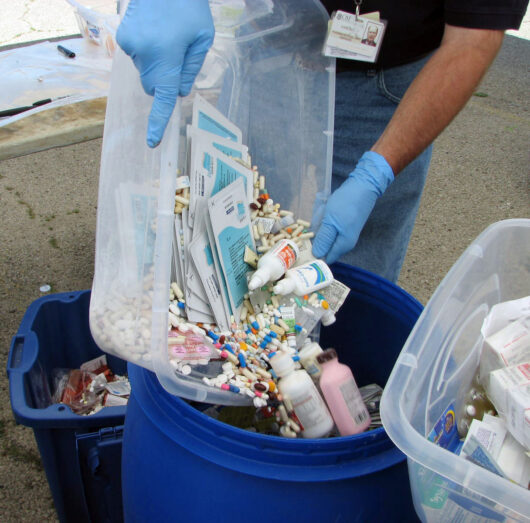Proper disposal of unused medications can help prevent drug abuse, poisonings, and overdose deaths, as many abused prescriptions are found in the home.
 MISUSE AND POISONINGS
MISUSE AND POISONINGS
According to the Centers for Disease Control and Prevention, over 100,000 drug overdose deaths occurred in the United States from November 2021 to November 2022. In addition, over 430,000 children under the age of five were evaluated in a healthcare facility between 2001-2008 after self-ingesting pharmaceutical products (Bond et al. 2012).
Pets can also be endangered if they find prescription or over-the-counter medications around the house or in the trash. Human and veterinary medications accounted for over 42% of the calls received by the ASPCA’s Animal Poison Control Center in 2019.
By promptly and properly disposing of any unwanted or expired medicine that accumulates in the home, the risks posed by these drugs to vulnerable groups like children and pets are reduced.
ANTIBIOTIC RESISTANCE
Antibiotic resistance is likely the most well-studied and well-known public health impact from medication in the environment. Antibiotics are essential for treating bacterial infections, but their improper use and disposal can lead to changes in normal bacterial communities in ecosystems, potentially leading to the emergence of antibiotic-resistant bacteria (Endale et al. 2023). Antimicrobials, such as triclosan, are so widely used that they are detected in aquatic environments and animals, and have been found in 75% of Americans (Weatherly and Gosse 2017). This can pose a serious threat to public health as antibiotic-resistant bacteria make infections more difficult to treat, leading to issues such as prolonged illnesses, increased healthcare costs (Salam et al. 2023), and reproductive and developmental problems in infants (Weatherly and Gosse 2017).
DRINKING WATER TREATMENT
Medications can enter the water system when people excrete them, wash them off, or improperly dispose of them by flushing them down the drain or toilet. Conventional treatment plants remove some pharmaceuticals, but many still slip through. One study found pharmaceuticals to be “ubiquitous” even in treated drinking water (Muambo et al. 2024). While these compounds typically appear in very low doses, their presence remains a concern. We know little about the long-term health effects of continuous exposure (Collier 2012).
Prevent Waste
Learn how to prevent medication waste in the first place.

FIND A DROP-OFF LOCATION
Use our interactive map to find a location near you to take your unwanted or expired medicine.
